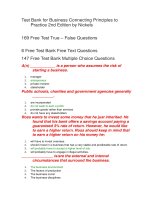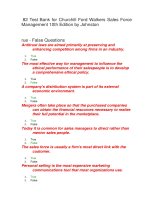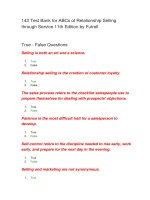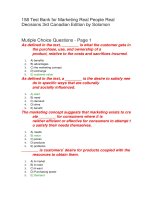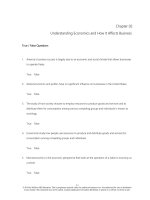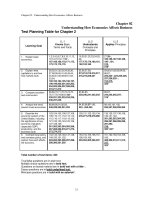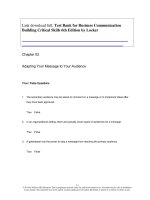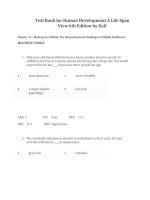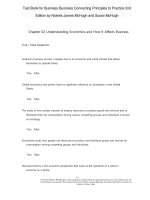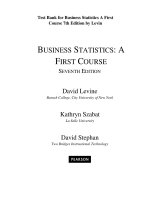Test bank for business business connecting principles to practice 2nd edition by nickels james mchugh and susan mchugh
Bạn đang xem bản rút gọn của tài liệu. Xem và tải ngay bản đầy đủ của tài liệu tại đây (1.38 MB, 291 trang )
Test Bank for Business Business Connecting Principles to Practice 2nd
Edition by Nickels James McHugh and Susan McHugh
link full download: />
Chapter 02 Understanding Economics and How It Affects Business
True / False Questions
1.
America's business success is largely due to an economic and social climate that allows
businesses to operate freely.
True
2.
False
Global economics and politics have no significant influence on businesses in the United
States.
True
3.
False
The study of how society chooses to employ resources to produce goods and services and to
distribute them for consumption among various competing groups and individuals is known
as sociology.
True
4.
False
Economists study how people use resources to produce and distribute goods and services for
consumption among competing groups and individuals.
True
5.
False
Macroeconomics is the economic perspective that looks at the operation of a nation's
economy as a whole.
2-1
© 2014 by McGraw-Hill Education. This is proprietary material solely for authorized instructor use. Not authorized for sale or distribution
in any manner. This document may not be copied, scanned, duplicated, forwarded, distributed, or posted on a website, in whole or part.
True
6.
False
Microeconomics focuses on the decisions and behavior of people and organizations in
particular markets.
True
7.
False
Resource development is concerned with finding the best way to utilize the fixed amount of
resources a society has available.
True
8.
False
Resource development is the study of how to increase resources and to create the conditions
that will make better use of those resources.
True
9.
False
Peace and prosperity will flourish if we can find the one best way to divide existing resources
among nations.
True
False
10. Thomas Malthus believed that overpopulation was a major cause of poverty.
True
False
11. In developing nations of the world, population has leveled off and is not expected to increase
dramatically in the future.
True
False
2-2
© 2014 by McGraw-Hill Education. This is proprietary material solely for authorized instructor use. Not authorized for sale or distribution
in any manner. This document may not be copied, scanned, duplicated, forwarded, distributed, or posted on a website, in whole or part.
12. Studies about the effects of population growth on the economy are part of macroeconomics.
True
False
13. Economic progress can occur when business owners provide jobs and economic growth for
their employees, their communities, and themselves.
True
False
14. Economist Adam Smith's important contribution was an inquiry as to why some nations are
wealthy, while others remain poor.
True
False
15. Adam Smith believed the self-interest of businesspeople would lead them to create needed
goods, services, and jobs.
True
False
16. The "invisible hand" in Adam Smith's theory turns self-directed gain into social and economic
benefits for all.
True
False
17. According to Adam Smith, the "invisible hand" refers to the government's effort to always
keep a check on the wealth creation of individuals, so that no one business would control a
market for a particular good or service.
True
False
18. A contemporary economic challenge is creating profitable businesses by selling goods and
services that contribute toward a healthier environment.
2-3
© 2014 by McGraw-Hill Education. This is proprietary material solely for authorized instructor use. Not authorized for sale or distribution
in any manner. This document may not be copied, scanned, duplicated, forwarded, distributed, or posted on a website, in whole or part.
True
False
19. An economist is examining how consumers in the automobile market have responded to
recent price increases by car manufacturers. He is examining a microeconomic situation.
True
False
20. Macroeconomics looks at long run economic problems while microeconomics examines short
run economic problems.
True
False
21. Thomas Malthus believed that people in most countries would never be able to achieve high
standards of living unless the problems of overpopulation were addressed.
True
False
22. Adam Smith believed that since businesspeople are motivated to improve their own
prosperity, their actions are unlikely to benefit society as a whole.
True
False
23. Adam Smith believed that an economic system couldn't truly prosper unless people were
taught to value the welfare of others above their own personal gain.
True
False
24. The concept of the invisible hand begins with the assumption that the primary motivation of
entrepreneurs is that they will prosper from their own hard work.
True
False
2-4
© 2014 by McGraw-Hill Education. This is proprietary material solely for authorized instructor use. Not authorized for sale or distribution
in any manner. This document may not be copied, scanned, duplicated, forwarded, distributed, or posted on a website, in whole or part.
25. Adam Smith's research focused on determining the best way to distribute a fixed amount of
resources, rather than on how to create more wealth.
True
False
26. Large educated populations can contribute to an economy by offering knowledge and
entrepreneurship.
True
False
27. Adam Smith believed that incentives to seek personal gain would create wealth, but that the
government must then step in to make sure that this wealth is equitably distributed.
True
False
28. As indicated by the Making Ethical Decisions box, activities that lead to corruption can
destroy free economic opportunities because they interfere with the right to freely compete.
True
False
29. In capitalist countries, the government decides what to produce and how the goods and
services will be produced.
True
False
30. Capitalism is the foundation of the U.S. economic system.
True
False
31. The most fundamental of all rights in capitalism is the right to private property.
2-5
© 2014 by McGraw-Hill Education. This is proprietary material solely for authorized instructor use. Not authorized for sale or distribution
in any manner. This document may not be copied, scanned, duplicated, forwarded, distributed, or posted on a website, in whole or part.
True
False
32. Under capitalism, the government prohibits people and businesses from competing with each
other.
True
False
33. A basic right under capitalism is the right of businesses to receive government funding.
True
False
34. Free-market capitalism has made it more difficult for individuals to gain wealth.
True
False
35. Due to the fundamental rights afforded to us by a free-market capitalistic system; persons are
more willing to take calculated risks.
True
False
36. A free-market economic system is one in which the market of buyers and sellers decides what
is produced, how much is produced, and how it is distributed.
True
False
37. Under the basic principle of supply, as the price goes down, manufacturers and suppliers of a
product tend to supply less of the product to the market.
True
False
38. Demand refers to the quantity of a good that consumers are willing and able to buy at
different prices at a specific time.
2-6
© 2014 by McGraw-Hill Education. This is proprietary material solely for authorized instructor use. Not authorized for sale or distribution
in any manner. This document may not be copied, scanned, duplicated, forwarded, distributed, or posted on a website, in whole or part.
True
False
39. At the equilibrium price, the quantity consumers desire to buy equals the quantity sellers
desire to sell.
True
False
40. If the quantity supplied in a market exceeds the quantity demanded, a shortage will exist.
True
False
41. If a shortage exists in a market for a good, the price of that good will tend to fall.
True
False
42. The point of intersection between the supply and demand curves is called the stress point.
True
False
43. In the long run, the market price tends to adjust toward the equilibrium point.
True
False
44. Countries that rely on a free market system are plagued by persistent shortages or surpluses
of goods and services.
True
False
45. One of the drawbacks of free markets is the fact that competition in such markets
undermines the ability of price to adjust to its equilibrium value in the long run.
2-7
© 2014 by McGraw-Hill Education. This is proprietary material solely for authorized instructor use. Not authorized for sale or distribution
in any manner. This document may not be copied, scanned, duplicated, forwarded, distributed, or posted on a website, in whole or part.
True
False
46. In perfect competition, each firm produces a product that is clearly differentiated from the
products of other firms in the same market.
True
False
47. A monopoly occurs when there is a single seller for a product or service.
True
False
48. Economists refer to a market in which a few sellers dominate the supply side as monopolistic
competition.
True
False
49. Product differentiation is a key to success in monopolistic competition.
True
False
50. In the United States, laws prohibit the creation of most types of monopolies.
True
False
51. One strength of a free-market economic system is that it emphasizes the fair and humane
treatment of the less fortunate in society.
True
False
52. The greed of businesspeople represents one of the greatest dangers to the operation of a
free market system.
2-8
© 2014 by McGraw-Hill Education. This is proprietary material solely for authorized instructor use. Not authorized for sale or distribution
in any manner. This document may not be copied, scanned, duplicated, forwarded, distributed, or posted on a website, in whole or part.
True
False
53. According to the Connecting with Small Business box, small loans do not provide assistance
to entrepreneurs in developing nations.
True
False
54. Fetna resides in a country where the economic system is primarily based on free market
capitalism.
Fetna is likely to have the freedom to buy and sell property.
True
False
55. A surplus currently exists for a product called widgets. In a free market system, the
government must step in and buy any widgets that consumers do not buy in order to
eliminate the surplus and establish equilibrium.
True
False
56. In a free market economic system, the lack of government control and regulation means that
businesses find it easy to take advantage of customers by offering poor quality products at
high prices.
True
False
57. History shows that free-market capitalism leads to a fair and equitable distribution of wealth.
True
False
58. Sarah owns a bakery that specializes in cupcakes. Until recently, she charged a price of $5 for
each treat. At this price Sarah's customers bought an average of 384 cupcakes each week. For
the last few weeks, she has reduced her price to $3.95 per cake, and her customers have
2-9
© 2014 by McGraw-Hill Education. This is proprietary material solely for authorized instructor use. Not authorized for sale or distribution
in any manner. This document may not be copied, scanned, duplicated, forwarded, distributed, or posted on a website, in whole or part.
purchased an average of 596 cupcakes each week. These results are consistent with the
economic concept of demand.
True
False
59. Monica notices that just a few big companies produce the vast majority of soft drinks. She
would be correct in describing the soft drink industry as an oligopoly.
True
False
60. GLAMOR GAL, a popular women's cosmetics company is gaining popularity among younger
women. Differentiating itself from the sea of companies that compete for the same business,
it focuses on products for sensitive, youthful skin. GLAMOR GAL clearly operates in an
oligopolistic environment.
True
False
61. GLAMOR GAL is a popular cosmetics company. Although it is gaining in popularity among
younger women, its promotional strategy continues to focus on the shadow-free finish that it
produces on almost any skin type. Due to the fact that its industry faces monopolistic
competition, the company knows that it must continue to differentiate itself from the
competition.
True
False
62. As you drive to school in the morning, you will probably flip through several radio stations
before deciding to settle on one for the duration of the drive. For instance: you can listen to
a "fair and balanced" talk show; an "intelligent talk" program; an interactive "call-in" talk show;
a "right-wing" political talk show; a "self-improvement" talk show; and, even an "all sports"
talk show. With so much monopolistic competition in radio programming, radio stations
focus on offering you something just a little different.
2-10
© 2014 by McGraw-Hill Education. This is proprietary material solely for authorized instructor use. Not authorized for sale or distribution
in any manner. This document may not be copied, scanned, duplicated, forwarded, distributed, or posted on a website, in whole or part.
True
False
63. Roland is a nation with an economic system that closely approximates pure capitalism. While
Roland's economy is likely to generate a great deal of wealth, it may do a poor job of
providing an acceptable level of income for the elderly or disabled.
True
False
64. In the newspaper this morning, you read about the downfall of a multi-national entertainment
business, and a report that the company's CEO enjoyed a 9% increase in his salary during the
same year that the company's profits were down 35%. As you read further, you learn that the
company's board of directors approved undeserved salary increases. Clearly, this is an
example of how inequality and greed can infiltrate the free-market economic system.
True
False
65. As you scan the national news online, you read about the BXY Utility Company's latest
problems. The story describes an expansive retaining wall that collapsed during a flood last
week, spewing toxic coal ash, burying homes, and causing a few fatalities. An editorial claims
that the company will not be held accountable to the same standards as the asbestos
companies of a few years back that paid severe fines and even went out of business due to
their lack of attention to environmental clean-up. You agree with the writer because you
recently studied about the various competitive markets and utility companies clearly fall under
monopolistic competition.
True
False
66. The PowerHouse Utility Company recently built a nuclear power plant in a southern state and
started competing against BXY Utility Company that has served customers in that region for
65 years. Due to deregulation, consumers now have a choice among utility companies in this
area. Although PowerHouse has made a sizeable capital investment, if it successfully grows
market share, eventually prices for electricity may stabilize or fall.
2-11
© 2014 by McGraw-Hill Education. This is proprietary material solely for authorized instructor use. Not authorized for sale or distribution
in any manner. This document may not be copied, scanned, duplicated, forwarded, distributed, or posted on a website, in whole or part.
True
False
67. Socialists believe that the primary economic function of the government is to promote rapid
economic growth.
True
False
68. In socialist economies, the government owns some, if not most basic businesses such as
telecommunications systems and utilities.
True
False
69. Thetop tax rate on personal income in most socialist economies is usually lower than the top
tax rate on personal income in capitalist economies.
True
False
70. The major benefit of socialism is that it creates strong incentives to work hard and take the
risks associated with starting and operating a business.
True
False
71. Socialists believe that wealth should be more evenly distributed than what actually occurs in a
freemarket capitalistic system.
True
False
72. Workers in socialist countries often get longer vacations and more social benefits than
workers in free market economies.
True
False
2-12
© 2014 by McGraw-Hill Education. This is proprietary material solely for authorized instructor use. Not authorized for sale or distribution
in any manner. This document may not be copied, scanned, duplicated, forwarded, distributed, or posted on a website, in whole or part.
73. Over the past decade, socialist economies have proven to be more successful at creating
wealth and jobs than capitalist economies.
True
False
74. One drawback of socialism is that it may result in a reduction in the individual's incentive to
work hard.
True
False
75. Brain drain is the loss of the best and brightest people to other countries.
True
False
76. High tax rates in socialist countries is a major reason these nations have experienced a brain
drain.
True
False
77. Incentive to own and operate businesses is high in nations whose governments are
proponents of socialistic practices.
True
False
78. One of the benefits of communism is that it allows individuals a great deal of freedom to
make their own economic decisions.
True
False
79. Communism is an economic and political system in which the state makes almost all
economic decisions and owns almost all the major factors of production.
2-13
© 2014 by McGraw-Hill Education. This is proprietary material solely for authorized instructor use. Not authorized for sale or distribution
in any manner. This document may not be copied, scanned, duplicated, forwarded, distributed, or posted on a website, in whole or part.
True
False
80. Most communist countries today are suffering from severe economic problems.
True
False
81. A major distinction between capitalism and socialism concerns the distribution of income.
True
False
82. Countries that wish to avoid shortages and surpluses of goods should adopt a communist
system.
True
False
83. Workers in nations who are strong proponents of communism work much harder and longer
hours.
True
False
84. In the small nation of Equalia, the government owns several of the key businesses and
provides a wide range of social services. The government places a great deal of emphasis on
eliminating large disparities in people's incomes. These features of Equalia's economy are
consistent with a socialist economic system.
True
False
85. Abby left her native land in Eastern Europe in order to become a nanny for a family in a
western suburb of Chicago, Illinois. One of the benefits of her arrangement was that she
could attend the community college near her family's residence. When she arrived at her new
job, she experienced the differences from a predominately socialist nation and a capitalist
2-14
© 2014 by McGraw-Hill Education. This is proprietary material solely for authorized instructor use. Not authorized for sale or distribution
in any manner. This document may not be copied, scanned, duplicated, forwarded, distributed, or posted on a website, in whole or part.
nation. Abby noted that public transportation in northern Illinois was limited and expensive,
making it difficult to get to school. For a negligible fee, the government in her native country
provided public transportation for everyone. Abby's native country's economic system was
more characteristic of socialism.
True
False
86. Socialism and communism are both variations of a free-market economy.
True
False
87. In command economies, the government plays a major role in deciding which goods are
produced and who will get them.
True
False
88. Governments that were predominantly capitalistic are moving toward socialism, while
governments that were predominantly socialistic are moving toward capitalism.
True
False
89. Like most nations, the United States has a mixed economy.
True
False
90. Most countries throughout the world can be classified as either purely capitalist or purely
socialist.
True
False
91. There is general agreement in the United States on the degree to which the government
should be involved in the economy.
2-15
© 2014 by McGraw-Hill Education. This is proprietary material solely for authorized instructor use. Not authorized for sale or distribution
in any manner. This document may not be copied, scanned, duplicated, forwarded, distributed, or posted on a website, in whole or part.
True
False
92. Subtle differences such as the right to one's religious preference make the command
economic system known as communism more like a mixed economy than a socialistic system.
True
False
93. In the past, socialist nations have realized that some of the government run businesses do
not grow as quickly as businesses that operate for a profit.
True
False
94. Although mixed economies tend to improve economic conditions, moral values prevent
communist nations such as China and Vietnam from progressing in this direction. Overall,
economic progress continues to be very slow in these nations.
True
False
95. Africa has been one of the fastest-growing regions in the 21st century.
True
False
96. In a mixed economy, the government's goal is to grow the economy and maintain some
measure of social equality.
True
False
97. Sweetland is a nation that publicly supports a free market economy with private ownership of
businesses. Over time, the government of Sweetland has developed policies designed to help
the needy and reduce the level of income inequality. It pays for these programs by levying
2-16
© 2014 by McGraw-Hill Education. This is proprietary material solely for authorized instructor use. Not authorized for sale or distribution
in any manner. This document may not be copied, scanned, duplicated, forwarded, distributed, or posted on a website, in whole or part.
relatively high taxes on businesses and workers. These arrangements suggest that the
economy of Sweetland is trending toward pure capitalism.
True
False
98. Deanne is a vocal critic of socialism. She likes to point out that in recent years the
governments in many socialistic nations have cut back on government services and have
reduced taxes. Deanne believes that this trend will ultimately result in all nations adopting
pure capitalistic ideals. Recent evidence suggests that Deanne's views are essentially correct.
True
False
99. Recently, Hugo Chavez, the Prime Minister of Venezuela announced that he is standing
behind the concept of state owned utilities and public schools in his nation. Although not all
industry is owned and managed by the government, his ideas would lead one to believe that
he has a preference for socialism.
True
100.
False
Most nations recognize that private enterprise is detrimental to business growth and what
is best for consumers. Recently, a nation had the opportunity to sell its government-owned
telecommunication system to a private firm. Instead it realized that it would be better off if it
raised taxes so that it could maintain the status quo.
True
101.
False
We use indicators such as (1) the gross domestic product (GDP), (2) the interest rate, and
(3) the price indexes to measure the health of our economy.
True
False
2-17
© 2014 by McGraw-Hill Education. This is proprietary material solely for authorized instructor use. Not authorized for sale or distribution
in any manner. This document may not be copied, scanned, duplicated, forwarded, distributed, or posted on a website, in whole or part.
102.
The total value of a country's output of final goods and services in a given year is known
as the gross domestic product (GDP).
True
103.
As of 2012, total GDP in the United States was over $14 trillion.
True
104.
False
False
Any output produced by U.S. firms is included in the value of U.S. GDP, even if the output
was produced in a foreign country.
True
105.
GDP figures do not include the value of illegal activities.
True
106.
False
False
To be classified as unemployed, a person must be at least 16 years old and trying to find
a job within the past four weeks.
True
107.
False
In 2010, the U.S. unemployment rate was at its lowest point in 10 years.
True
False
108.Frictional unemployment occurs because the economy is experiencing a recession.
True
False
2-18
© 2014 by McGraw-Hill Education. This is proprietary material solely for authorized instructor use. Not authorized for sale or distribution
in any manner. This document may not be copied, scanned, duplicated, forwarded, distributed, or posted on a website, in whole or part.
109.
Structural unemployment refers to unemployment caused by the restructuring of firms or
by a mismatch between the skills or location of job seekers and the requirements or location
of available jobs.
True
110.
Inflation refers to a general rise in the prices of goods and services over time.
True
111.
False
Inflation refers to the persistent rise in the purchasing power of money.
True
112.
False
False
Disinflation refers to a situation in which prices continue to rise, but not at the rate they
were rising previously.
True
113.
Deflation means prices are declining.
True
114.
False
False
The consumer price index (CPI) measures what is happening to prices at the wholesale
level.
True
115.
False
The CPI measures the pace of inflation or deflation.
True
False
2-19
© 2014 by McGraw-Hill Education. This is proprietary material solely for authorized instructor use. Not authorized for sale or distribution
in any manner. This document may not be copied, scanned, duplicated, forwarded, distributed, or posted on a website, in whole or part.
116.
The CPI is based on the prices of a carefully selected market basket of goods, all of which
consumers can purchase at a supermarket.
True
117.
Some wages, tax brackets, interest rates, and government benefits are based on the CPI.
True
118.
False
Productivity of workers in the U.S. is helped by the use of better machinery.
True
121.
False
The producer price index measures what is happening to prices at the wholesale level.
True
120.
False
Core inflation figures omit healthcare prices, but not energy prices.
True
119.
False
False
The higher the measurement of productivity, the higher the likely costs of production.
True
False
122.An increase in productivity means that a worker is now able to produce more goods and
services in the same amount of time.
True
123.
False
As productivity increases, the cost of producing goods and services is likely to fall.
2-20
© 2014 by McGraw-Hill Education. This is proprietary material solely for authorized instructor use. Not authorized for sale or distribution
in any manner. This document may not be copied, scanned, duplicated, forwarded, distributed, or posted on a website, in whole or part.
True
124.
False
In the service sector of the economy, the influx of machinery such as computers increases
output per worker, but does little to improve the quality of services.
True
125.
False
Current measures of productivity in the service sector provide an accurate measure of
changes in the quality of output.
True
126.
False
An economy is said to be in a recession if GDP declines for two or more consecutive
quarters.
True
127.
A depression is a severe recession that is often accompanied by deflation.
True
128.
False
False
A prediction that GDP will increase significantly over the next six months is bad news for
most businesspeople.
True
False
129.Although changes in the CPI provide interesting insights into the overall performance of the
economy, these changes have little practical impact on the lives of ordinary people.
True
False
2-21
© 2014 by McGraw-Hill Education. This is proprietary material solely for authorized instructor use. Not authorized for sale or distribution
in any manner. This document may not be copied, scanned, duplicated, forwarded, distributed, or posted on a website, in whole or part.
130.
It is understandable that productivity is rising faster in the service sector because service
businesses have newer technologies than the manufacturing sector and fewer laborers.
True
131.
False
A rising GDP, rising unemployment rate, and rising inflation rate signify a healthy
economy.
True
132.
False
A problem with the CPI is that it measures the price changes of only food and clothing,
while ignoring what happens to the prices of such important items as medical care and
energy.
True
133.
False
Danny was laid off from his job five months ago. At first, he looked for a new job every
day. During the past six weeks, however, Danny became depressed about his employment
status and quit trying to find a job. According to the criteria used by the government, Danny
is a civilian whose job status is included in computing the national unemployment rate.
True
134.
False
Larry and Moe are having an argument. Larry believes that over the past year, the
economy is experiencing rapid inflation, while Moe says that the economy actually
experienced disinflation during this period. The easiest way for Larry and Moe to settle their
argument is to look at GDP figures for the past year.
True
False
135.Maureen is the office manager of a service company. She recently approved the installation
of new computers and office equipment for all workers in her office. If Maureen's company is
2-22
© 2014 by McGraw-Hill Education. This is proprietary material solely for authorized instructor use. Not authorized for sale or distribution
in any manner. This document may not be copied, scanned, duplicated, forwarded, distributed, or posted on a website, in whole or part.
like most service companies, she will probably see a big jump in the productivity figures
reported for workers in her office.
True
136.
False
The government of Velovia made progress in its efforts to bring rapid inflation under
control. Although prices are still rising, the rate of increase has slowed considerably. This
suggests that Velovia is experiencing disinflation.
True
137.
False
The nation of Desperia is reporting a significant decline in GDP for four consecutive years,
with no relief in sight. With unemployment at record levels and businesses failing faster than
at any time in the past century, Desperia is likely experiencing a depression.
True
138.
False
Yesterday, Casey received a cable company ad for bundled TV, telephone, and Internet
service that cost appreciably more than what she is currently paying. At the same time, she
received a notice from her utility company that summer rates would be increasing. Her school
books are costing almost twice what they cost last year, and yesterday, gasoline cost her 30
cents more per gallon than it did last week. As she ponders the situation, she can't help but
wonder how prices could be rising when so many people have lost their jobs and are cutting
back on expenditures.
She is certain that this situation characterizes her economics professor's description of
stagflation.
True
False
139.Sam is a recent college graduate with a lot of "firsts": First professional job, first new car, first
apartment, and first time making all of his own financial decisions. As he works on his
monthly budget, he can't help but wonder why he is barely "making ends meet." Each month,
2-23
© 2014 by McGraw-Hill Education. This is proprietary material solely for authorized instructor use. Not authorized for sale or distribution
in any manner. This document may not be copied, scanned, duplicated, forwarded, distributed, or posted on a website, in whole or part.
it takes his entire paycheck to pay his rent, his car payment, and buy food. Last month, he
told his parents, "I'm sure I had more money when I was a starving student!" You recently
learned about key economic indicators in your business class. You inform Sam that his
problems are caused by severe deflation and lack of demand for products and services.
True
140.
False
Robin just graduated from college and is seeking her first job. She received a degree in
engineering at a prestigious university. Robin has several leads and has heard that the market
for engineers is very strong, so she is convinced that she should locate a good job in the near
future.
Robin's current situation is an example of structural unemployment.
True
141.
False
Fiscal policy refers to the federal government's efforts to keep the economy stable by
controlling the amount of money in circulation.
True
142.
False
Fiscal policy involves the federal government's efforts to stabilize the economy by
increasing or decreasing taxes and/or government spending.
True
143.
False
When the government attempts to stabilize the economy by changing taxes or
government expenditures, it is using fiscal policy.
True
144.
False
The national deficit is the difference between our nation's exports and its imports.
2-24
© 2014 by McGraw-Hill Education. This is proprietary material solely for authorized instructor use. Not authorized for sale or distribution
in any manner. This document may not be copied, scanned, duplicated, forwarded, distributed, or posted on a website, in whole or part.
True
145.
The size of the national debt increases when the federal government runs a deficit.
True
146.
False
Monetary policy is directly under the control of the U.S. Department of the Treasury.
True
149.
False
The Federal Reserve Board is responsible for controlling the money supply.
True
148.
False
The U.S. national debt equals the sum of all recorded years of deficits.
True
147.
False
False
One of the major ways the Fed influences economic conditions is through its control of
interest rates.
True
150.
False
High tax rates that put money into the government's coffers tend to slow spending, and
ultimately slow the economy.
True
151.
False
If the government wants to jump-start the economy resulting in more consumer
spending, it will raise taxes.
True
False
2-25
© 2014 by McGraw-Hill Education. This is proprietary material solely for authorized instructor use. Not authorized for sale or distribution
in any manner. This document may not be copied, scanned, duplicated, forwarded, distributed, or posted on a website, in whole or part.
